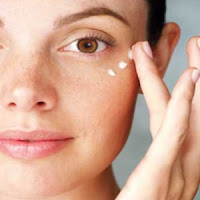Today's blog topic was sidetracked (Come to find out, disappointingly, The Green Boheme is closed on Wednesdays!) so we'll try that post next week.
This week we�d like to focus on women. Specifically, women, hormones, and the skincare products we use.
I think society has instilled this great fear in us as women; this fear of aging, fear of not being as beautiful as we once were. Most of us have fallen for it in some way or another; the creams, lotions, and products that promise we stay young, beautiful, firm, and smooth.
Many of us have bought into, in some way, the idea that we are what we look like. We are the outward appearance of ourselves, our bodies, and our skin.
My husband calls them laugh lines, which I prefer, and didn�t realize I had until he pointed them out to me some five years ago. I have since had a love-hate relationship with these ever-present wrinkles, but since hearing my mother�s story and knowing cancer runs in our family, have reconsidered the use of anti-aging creams for the time being. I often put extra virgin coconut oil on my face or aloe vera. TropicalTraditions makes safe face and body lotions with no parabens or hormones in them.
�The anti-aging industry is expected to gross more than $291 billion worldwide by 2015� (Voss, 2012).
In using these products with good intentions, we have unknowingly subjected our bodies to huge increases in hormones that needn�t be labeled on packages, though they can have huge impacts on our own health. Dr. Monroe has a personal story to share to this effect, with the hopes that it helps more women realize the hormonal changes that can be caused by these products and help women use this knowledge to empower other women.
Dr. Monroe: �I�d like to share my story of hormone overdose and why it has become a commitment to my patients to prevent this from happening to other women.
About a year ago I was having a great deal of trouble sleeping. I could fall asleep, but woke up within a few hours and couldn�t get back to sleep again. Also, I was experiencing anxiety and trouble keeping weight off, as well as mood swings. I decided to have my hormone levels assessed by a lab, one of few labs who do hormone panels well. It came back with my E2 levels (which should have been between 2 and 10) at greater than 99. My progesterone was also elevated at a level of 481. This level should have been around 95.
In a state of stress and increasing anxiety I called the lab to see what was going on. The response was that these results were normal for someone on Hormone Replacement Therapy. I replied, �I�m not on HRT,� and their response was, �Yes, you are!� Since I was only using one product on my skin (an anti-aging cream purchased at Costco), I decided to call their company and see if they had hormones in the product. I was placed on hold for several minutes while the pleasant receptionist did some checking. She came back on the line and responded �No.� I wondered if she was not telling the truth or if she didn�t know the truth. (From the lab I learned that the FDA allows companies to put hormones in their products without ever putting it on the label.)
I stopped using the product and repeated the lab test a few months later. By this time I was sleeping wonderfully again. The results on my new lab work came back with my E2 at 6 and my progesterone at 200. This is a very good ratio, and I was pleased with these new results since I stopped using the cream.
The dif?culty I experienced as my body adjusted to the decrease in estrogen from greater than 99 down to 6 was like going through menopause all over again on my brain. I experienced poor memory for several months as this shift was occurring. At about this same time I had a dear friend diagnosed with breast cancer. Now many of us know loved ones with this diagnosis, but to me it took on a new meaning. The traditional medical world puts women on Tamoxi?n to block the estrogen effect on women who have estrogen positive breast cancer. The problem to me is that their estrogen levels aren�t monitored. Since many skincare products have hormones in them, it has become a challenge to me to get women monitored. Thus protecting them from exogenous hormones and helping the women who are naturally estrogen dominant to become balanced.�
I�d love to work with women who are questioning if this could be a problem for them. I can be reached at my of?ce number, 916-448-9927 or at drpjmonroe(at)gmail.com.
--Dr. Priscilla Monroe RN, ND
----------------------------------------------------------------------------------------------------------------------------------
The Federal Food, Drug, and Cosmetic Act enacted in 1938 governs skin creams, including anti-aging creams. �Currently, even if a skin cream behaves like a drug by affecting the structure or any function of the body, it will generally be considered a cosmetic under the Act if the manufacturer refrains claiming that the AHA product works like a drug. Products classified as cosmetics under the Act are relatively unregulated; the Act does not subject them to most of the restrictions imposed upon drugs- including mandatory registration, premarket safety and effectiveness testing, premarket FDA approval, and postmarket surveillance to monitor safety� (Hensel, 1995).
So, next time you�re considering that eye cream or anti-aging night cream at the drugstore or beauty counter, consider the price you may be paying for it in the long run, and decide for yourself if it�s really worth it.
Have a safe and healthy weekend� (wrinkles and all)!
--Briana
----------------------------------------------------------------------------------------------------------------------------------
Additional resources: http://leda.law.harvard.edu/leda/data/93/dhensel.pdf
http://www.oregonlive.com/health/index.ssf/2011/11/survey_asks_1000_portland_wome.html
http://www.oregonlive.com/health/index.ssf/2011/11/survey_asks_1000_portland_wome.html




